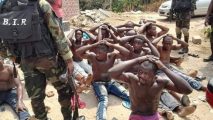Privacy Overview
This website uses cookies so that we can provide you with the best user experience possible. Cookie information is stored in your browser and performs functions such as recognising you when you return to our website and helping our team to understand which sections of the website you find most interesting and useful.


















12, October 2021
Southern Cameroons Crisis: Vatican urged to mediate 0
There have been fresh calls for the Vatican to mediate the increasingly violent conflict between Cameroon’s Anglophone minority and the central government. Recent events have prompted civil society to appeal for the Church to offer its services as an impartial and respected intermediary.
Past weeks have seen an upsurge in violence between armed separatist groups and the Cameroon military. Anglophone forces fighting for an independent country are using improvised explosive devices against the Cameroon armed forces to devastating effect. Human rights groups have warned that the military is targeting villages in response, with unarmed civilians bearing the brunt of the suffering. International observers, such as the Global Campaign for Peace & Justice in Cameroon, urge that military force will not address grievances and a mediation table is necessary.
In 2019, the Centre for Humanitarian Dialogue in Switzerland offered to hold peace talks between the armed sides. Although some pro-independence groups have signed on, the Cameroon government has not attended. More than two years later, Cameroonians and the world are waiting.
Cameroon-watchers suggest the time is now right for another credible institution to bolster efforts to bring all sides, including civil society, to the negotiating table.
Lord Alton commented: “I have followed events in the troubled Anglophone regions of Cameroon since violence broke out, and local contacts believe that circumstances are now changing. This is the moment for the Vatican to once more offer itself as an impartial mediator, trying to get all parties to the conflict to participate in peace talks. There is a military stalemate between separatist forces and the Cameroon government, with unarmed civilians suffering intolerable conditions, caught in the middle. The Church’s renewed participation could be a game changer – bringing about a ceasefire and offering much needed hope to Cameroon’s Anglophone citizens.”
The calls from civil society have been endorsed by Dr Chris Fomunyoh from the National Democratic Institute in Washington DC. “The Vatican has moral authority worldwide, including with government leaders in Cameroon. How can it afford not to leverage those relationships to bring peace and social justice to a bleeding nation where 20 percent of its population constituted of the minority Anglophones face an existential threat now and for future generations?”
Dr Fomunyoh continued, “I think of the very instrumental role played by the Rome-based and Vatican-connected Community of Saint Edigio in bringing peace to then war-torn Mozambique in the early 1990s, and wonder why such an effort cannot be undertaken for Cameroon where thousands have been killed, close to 400 villages burnt, and over one million dislocated either as internally displaced persons of refugees.”
Background to the Anglophone Crisis
What began in 2016 as peaceful protests against the imposition of the French language and institutions on the minority Anglophone population, degenerated into a violent struggle between separatist fighters calling for an independent country called ‘Ambazonia’ and the Cameroon government and military of President Paul Biya, in power since 1982. Thousands of civilians have been killed, hundreds of villages have been burned, the majority of schools have been closed for four years, and nearly one million people (out of a population of six million) are or were internally displaced, with seventy thousand more thought to be in exile in neighbouring Nigeria while others are scattered as refugees elsewhere.
In January 2021, the Vatican Secretary of State, Cardinal Pietro Parolin, visited Cameroon, urging President Biya to enter peace talks to no avail. However, with changing circumstances on the ground, the moment is ripe for the Vatican’s reengagement. Catholic priests and other religious figures have been targeted during the conflict. As a key moral authority, the Church should be central to efforts to find a peaceful way forward using the negotiating table.
Source: Independent Catholic News